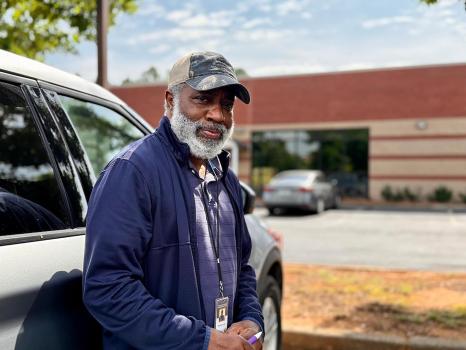By Stateline.org’s Anna Claire Vollers
Huntsville, Alabama. Mike Leslie, 66, is seated at a desk with his fingertips hovering over his new laptop keyboard under the hum of fluorescent office lights. His eyes crinkle under a battered baseball cap as he smiles. He never thought he would be seated there.
He had never used a computer before last year.
Leslie hadn’t needed one for the majority of his life. He worked for 36 years in the pipe manufacturing industry close to his hometown in North Alabama, doing tasks including welding, forklift operation, concrete mixing, and foremaning crews. He didn’t mind the physically demanding and difficult task.
The COVID-19 pandemic then struck. There were layoffs as a result.
In an era when more prosperous men may consider retirement, Leslie found himself in need of a job to help support himself. Manufacturing was no longer his forte. However, he was also unfamiliar with the technology that runs the internet, email, and Microsoft Office—the tools that are today used for even the most basic activities in almost every modern business.
According to him, many people believe that elderly people are no longer relevant. They have a wealth of information in their brains. All they need is the chance to express themselves and gain new knowledge.
The Senior Community Service Employment Program, a little-known state-federal program, was the catalyst for the start of his surprising second act in late 2023. It offers low-income individuals 55 and older compensated part-time employment at government and nonprofit organizations including the Red Cross, libraries, and senior centers. The goal of its on-the-job training is to get trainees ready for the move into permanent positions.
However, in Washington, D.C., 700 miles away, Congress is thinking about cutting the funds for the exact program that has enabled Leslie to start this new chapter in her life. President Donald Trump has suggested doing away with this and a few other programs that are part of the Older Americans Act, a historic 1965 statute that provide social and meal services to the elderly, in his budget for the upcoming fiscal year. Additionally, the Senate suggested maintaining financing for the job program, while the House of Representatives suggested cutting it.
Experts argue that anything is conceivable at this stage.
Proponents worry that the elimination of this program, which serves over 50,000 senior citizens across the country, may have an impact on communities beyond simply Leslie, displacing tens of thousands of workers from senior centers, city recreation centers, and local libraries.
Uncertain and alone
After being laid off, Leslie sat at home feeling alone and uncertain about what to do. After hearing about the job program from a friend, he ultimately made the decision to apply. He entered.
He currently assists in overseeing the fleet of automobiles at the Top of Alabama Regional Council of Governments, a Huntsville-based multicounty organization that offers assistance to the elderly and disabled. As part of the program, he signed up for a digital certification course that taught him the fundamentals of social media, email, the internet, and the Microsoft Office suite. He also received a laptop and prepaid internet access.
It has given Leslie access to a workforce that seemed to have moved on without him.
He asserts that you have a purpose when you wake up each morning and go to work that you enjoy.
Everyone in the office calls him Mr. Mike, and he is a favorite.
He wore a three-piece suit to the office-wide celebration in April, when he was given a certificate of graduation for excelling in his digital skills classes. As he described to his colleagues how the training restored his confidence, he brought them to tears.
Lost in Washington, D.C.
Some of Leslie’s supervisors at the Top of Alabama Regional Council of Governments, or TARCOG, were gathered around a table in a conference room near his desk on a recent Wednesday afternoon, debating what to do.
The past few months had been hectic. TARCOG is in charge of managing a wide range of services for senior citizens, including transportation, caregiver support, Meals on Wheels, and programs that guard against exploitation and abuse.
The Trump administration started dismantling the federal agency in charge of monitoring these services earlier this year, and his proposed federal budget suggested reducing or freezing funding for them, including the job program.
Local officials who were shocked that Meals on Wheels would be discontinued had been asking questions of Michelle Jordan, executive director of TARCOG. Advocates at similar agencies, both national and local, raised the alarm across the nation. Local organizations such as TARCOG have reported delays in receiving promised federal monies in certain areas.
The Trump administration changed its mind earlier this month and suggested that the majority of the older adult programs remain under a new federal agency.
These folks have dedicated their lives to hard work. However, they are unable to pay the heating bill. They must choose between groceries and medication.Nancy Robertson, the Top of Alabama Regional Council of Governments’ previous executive director
However, funding for certain of the Older Americans Act’s programs would be cut. The elder employment program is among the most extensive.
Sheila Dessau-Ivey, who oversees TARCOG’s aging initiatives, stated, “I think that in D.C., people forget that these are real people.” They simply remark, “Well, we don’t need these,” after seeing the programs and money. However, a human life is truly linked to those dollars.
When compared to fiscal giants like Medicaid and Medicare, the Senior Community Service Employment Program is little. With an annual budget of over $400 million, it provides services to roughly 50,000 senior citizens across the country. Leslie’s slot is one of 86 that are located within the five-county region of North Alabama that TARCOG serves.
A individual must be at least 55 years old, unemployed, and have a family income of no more than 125% of the federal poverty threshold in order to be eligible for the national Senior Community Service Employment Program. At now, that amounts to $19,562 annually for an individual. Priority in the program is given to veterans, persons with disabilities, those living in rural areas, those over 65, and those who are homeless. The U.S. Department of Labor is the primary source of funding.
According to Jordan, there have been employees who were homeless when they first began this program. According to earlier studies, around three out of five individuals nationwide reported being homeless or at risk of becoming so.
You forget that there are people who live with us, sit next to us at church, and accompany us to the grocery store, but they simply lack those abilities or that self-assurance, she remarked.
Additionally, it significantly affects other susceptible groups. According to studies, over 44% of participants were Black in 2019 and approximately two-thirds were women. Most participants said they had only completed high school.
Nancy Robertson, the retired former executive director of TARCOG, came into the office to share her experience with the group on how to campaign for funds, saying, “These are people who have worked hard all their lives, but they can’t pay the heating bill.”
They must choose between groceries and medication.
According to her, the elimination of the program will affect more people than just the participants.
The program is open to participants for a maximum of four years. While they re there, they providemore than 40 million hoursof work to public and nonprofit agencies across the nation. The organizations and community organizations that employ the participants and pay them with program-funded salaries would no longer have those staff members. For instance, a small-town library may only be able to stay open during specific hours due to the efforts of one of its employees.
The closure of the job program would result in the loss of 14 staff at the local senior center in Huntsville. Across town at a community rec center, a beloved 91-year-old receptionist would lose the job she trained for.
Related Articles
-
As ICE raids intensify, how do employers know if their workers are legal?
-
Prosecutor says Sean Diddy Combs thought he was above the law as he led a racketeering conspiracy
-
Majority of US adults support religious chaplains in public schools, a new poll shows
-
The Latest: Hegseth praises US attack on Iran but offers few details on the strikes impact
-
Today in History: June 26, US Supreme Court legalizes same-sex marriage
Chaos in Congress
The U.S. population is aging rapidly. In 2003, about 1 in 7 people in the U.S. labor force was 55 or older. By 2023, that share was nearly 1 in 4. One of the looming challenges for lawmakers and community advocates is how to keep older people healthy and thriving.
Marci Phillips, director of public policy and advocacy at the National Council on Aging, a nonprofit organization that focuses on issues affecting older adults, stated that it doesn’t make sense to cut funding for a work program that is intended to assist older people, especially as Republicans consider adding work requirements to programs like Medicaid.
If people age 55 and older have to show they re working to qualify for Medicaid, but [lawmakers] are cutting the federal program to help workers age 55 and older, there s a disconnect there, she said.
Some lawmakers question the usefulness of the program. In 2019, only about 38% of participants who exited the program were employed a few months later, according toa 2022 study. That share was below the U.S. Department of Labor s goal of 42%. Median earnings were also below federal goals.
Phillips said the program shouldn t be judged by the metrics that are used to measure whether a traditional workforce development program is succeeding.
These are older adults who have to work, but the realities of their health and their caregiving situations aren t changing, she said. It s a standard that doesn t really recognize the population we re trying to serve.
Programs that are funded under the Older Americans Act are discretionary, meaning Congress can t cut or eliminate them in the reconciliation bill that s currently before the Senate and that has generated public outcry over potential cuts to programs including Medicaid and the Supplemental Nutrition Assistance Program, commonly known as food stamps.
Trump has recommended eliminating funding for the employment program, but ultimately its fate lies in the hands of Congress.
The U.S. House is scheduled to take up the appropriations bill that provides funding for these programs the week of July 20. The Senate s plans are less certain, as its members remain focused on Trump s reconciliation bill, the One Big Beautiful Bill Act. And it s conceivable, Phillips said, that Congress may instead pass a continuing resolution, a temporary measure that keeps the government funded at current levels.
For his part, Leslie would like to travel to Washington to testify before Congress. If anyone understands the needs of older Americans, he figures, it s them.
Society looks at older people as not useful, but if you look at the people in Congress, they re old folks too, Leslie said. If you re old, why would you not want another older person to have something, to learn something?
Future possibilities
Leslie is studying to earn his license as a private investigator. It s a job he s always wanted, and now he feels like he has the skills he needs to chase that dream.
He s also trying to organize a workshop this fall to be held at his church, Beaver Dam Primitive Baptist, where he hopes he and some of his TARCOG co-workers can share about services and programs available to help older adults.
We ve got 26 churches in our association, so we ve reached out to all of them, saying there s these things you need to know about, Leslie said. If I had known about some of this stuff when my dad was living, he may have had a better quality of life.
He doesn t know if his own program will be one of those still available by then, but he s hopeful.
He believes the biggest reward has been less tangible than the modest paycheck and newfound computer skills, but more profound: The sense that his life has opened back up, full of possibilities.
Senior citizens have a purpose in this world, and we can t think that because they re old we can just throw them away, Leslie said. They ve still got knowledge. I think we should give them every chance to succeed.
2025 States Newsroom. Visit at stateline.org. Distributed by Tribune Content Agency, LLC.











